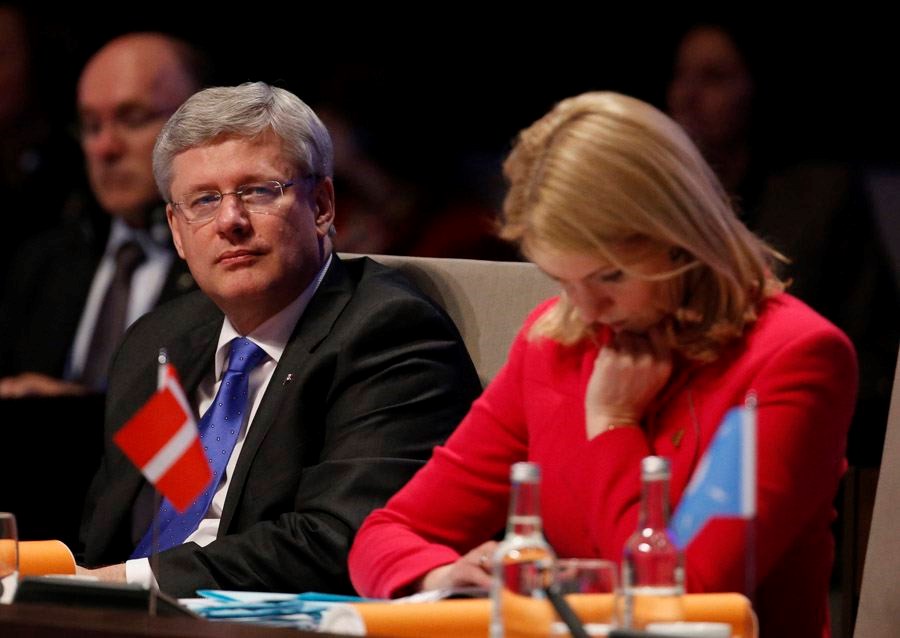THE HAGUE, Netherlands - Stephen Harper and his fellow G7 leaders say they are suspending their participation in the Group of Eight until Russia "changes course."
In a joint statement, the G7 nations say they will instead meet without Russia.
The move is aimed at isolating Moscow as punishment for its annexation of the Crimean peninsula from Ukraine.
The G7 nations have issued the statement following today's emergency meeting in the Netherlands.
The leaders say they are ready to "intensity actions" against Russia if Moscow escalates the conflict further.
Ukraine today told its remaining troops in the Crimean peninsula to leave the Black Sea region, formally annexed by Russia last week, because it's too dangerous to remain.
The gathering began at about 6:30 p.m. local time on the sidelines of the Nuclear Security Summit, and went about a half hour longer than expected.
U.S. President Barack Obama was the first to arrive and was greeted by Dutch Prime Minister Mark Rutte at his official residence.
The G7 leaders joked and laughed together briefly before getting down to business - what to do about Russia's aggression in eastern Europe amid the worst crisis for the region since the Cold War.
Earlier in the day, Harper said economic concerns will have to take a back seat as the West determines how to respond to Russian aggression.
"Within the context of Canadian foreign policy, we will do what we can to maximize the commercial opportunities for our firms," the prime minister told a roundtable with Dutch business representatives.
"But," he continued, "we will not shape our foreign policy to commercial interests."
When it comes to a global security crisis such as that unfolding in Ukraine, Harper said, "business people have to be aware that there may be risks to them and the government will take those risks, because at those points in times the government's foreign and security policy priorities become paramount."
The remarks likely foreshadowed what Harper would say at the summit itself.
The meeting came shortly after Russia announced a travel ban on 13 Canadian politicians and officials in retaliation for travel and economic sanctions Canada imposed earlier this month.
The list is a mixed bag that includes the Speaker of the Commons, a cabinet minister, MPs noted for their support for human rights, a senator known for her work on Canadian-Ukrainian relations and the head of a Ukrainian-Canadian organization. Some have recently travelled to Ukraine.
The politicians are: Speaker Andrew Scheer; Peter Van Loan, the government House leader; Tory MPs Dean Allison, Ted Opitz, and James Bezan; Liberal MPs Irwin Cotler and Chrystia Freeland; NDP MP Paul Dewar; and Conservative Sen. Raynell Andreychuk.
The officials are: Wayne Wouters, clerk of the Privy Council; Jean-Francois Tremblay, deputy secretary to the cabinet; and Christine Hogan, assistant secretary to the cabinet.
Paul Grod, national president of the Ukrainian Canadian Congress, rounds out the list of the banned.
"I was expelled from the Soviet Union in 1979," Cotler tweeted. "I did not stop fighting for human rights then, nor will I stop now."
Harper is the only G7 leader who has personally witnessed the devastation in Kyiv and spoken face-to-face with Ukraine's new leadership.
Harper has called for a "complete reversal" of Russia's annexation of Crimea and has also warned long and loudly that Russian President Vladimir Putin cannot be trusted amid the worst crisis for the region since the Cold War.
He's also expected to argue that Putin's actions will spur similar brazen territory grabs if they go unpunished.
Obama, meantime, is facing a test of his sway over the G7 as he attempts to convince his European allies to exert more pressure on Russia.
Foreign policy experts say Harper and Obama would likely present a united front to their European colleagues on Russia. Europe, however, does far more trade with Russia and many European economies are still fragile following the 2008 global economic downturn.
Some G7 members have therefore been more reticent about tougher economic sanctions against Moscow, although German Chancellor Angela Merkel has recently shifted towards the North American stance, reportedly fed up with false assurances Putin gave her about Crimea.
"As long as the political environment for the G8 is not at hand, as is the case at the moment, there is no G8 - neither as a concrete summit meeting or even as a format for meetings," she said before the talks.
White House officials have said Obama is prepared to launch widespread penalties against key sectors of Russia's economy, including its energy industry, if Putin dares move into southeastern Ukraine.
Russian troops are already amassing on the southeastern border of Ukraine. There are concerns that Russia could use the unrest in the eastern reaches of the country, where there's a large Russian minority, as a pretext for crossing the border.
One observer - Ken Brill, former U.S. ambassador to the International Atomic Energy Agency - said while Putin might publicly shrug off an expulsion from the G8, it will privately "rankle" the Russian leader.



